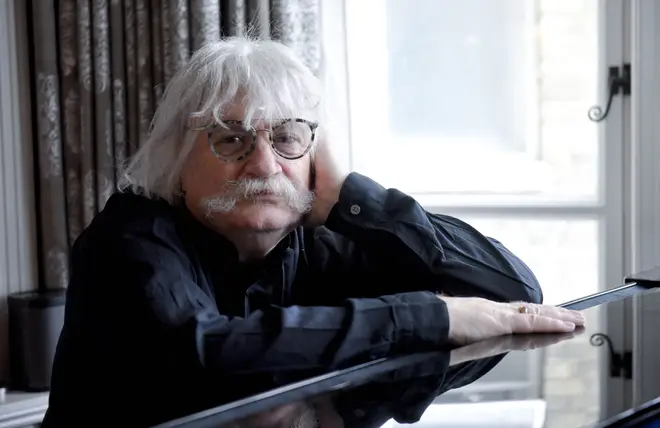On Air Now
Relaxing Evenings with Zeb Soanes 7pm - 10pm
5 May 2021, 17:07

It’s easy to forget how groundbreaking ‘Adiemus’ was when it first aired on the radio. We dive into Karl Jenkins’ lyrics, and what they really mean.
“The sound is universal, as is the language of music,” Karl Jenkins said of his most famous piece (alongside The Armed Man: A Mass for Peace).
To describe ‘Adiemus’ as a work for sopranos and orchestra, would be to box it into a preexisting form that the Welsh composer would likely challenge.
While its inspirations are gospel and African music, and the percussion part grounds the free-flowing vocals with a tribal-like rhythm, the song uses the forms of European classical tradition – like rondo and ternary.
Jenkins, who is one of the most performed living composers in the world, was commissioned by Delta Airlines in 1994 to write a song for their new television advert.
And so, ‘Adiemus’ was born.

Karl Jenkins - Adiemus
Later that year, Jenkins developed the new-age ditty into a full-blown choral work.
In 1995 it was officially released on the album Adiemus: Songs of Sanctuary with South African soloist Miriam Stockley, whose voice is charged with a boundless fusion of styles and world music influences.
The second female singer, Mary Carewe, harmonises in parallel, creating a curious non-Western classical music soundworld.
Read more: What makes ‘Benedictus’ from The Armed Man so haunting? >

Karl Jenkins writes in his performance note for ‘Adiemus’ that the lyrics are written in “an invented language”.
The text has no meaning per-se, rather the vocals were written as sounds to mimic a musical instrument – the idea being that the listener is more able to focus on the free-flowing vocal phrases.
“The text was written phonetically with the words viewed as instrumental sound, the idea being to maximise the melisma by removing the distraction, if one can call it that, of words,” Jenkins says.
The vocal sounds have a folk quality, and the melodies have been attributed to African-tribal and Celtic-style inspiration.
Some have suggested the lyrics bear an unintentional resemblance to Latin. Jenkins later explained that he made up the word ‘Adiemus’ and was unaware that it roughly translates in Latin to ‘We will draw near’.

Sir Karl Jenkins explains what's so special about 'Benedictus'
Ariadiamus la-te ariadiamus da
Ari a natus la-te adua
A-ra-va-re-tu-e-va-te
A-ra-va-re-tu-e-va-te
A-ra-va-re-tu-e-va-te-la-te-a
Ariadiamus la-te ariadiamus da
Ari a natus la-te adua
A-ra-va-re-tu-e-va-te
A-ra-va-re-tu-e-va-te
A-ra-va-re-tu-e-va-te-la-te-a
A-na-ma-na-coo-le-ra-we
A-na-ma-na-coo-le-ra
A-na-ma-na-coo-le-ra-we-a-ka-la
A-na-ma-na-coo-le-ra-we-a-ka-la
Ah-ya-doo-way-ye
A-na-ma-na-coo-le-ra-we-a-ka-la
Ah-ya-doo-way-ye
A-ya-doo-a-ye
A-ya-doo-a-ye
A-na-ma-na-coo-le-ra-we
A-na-ma-na-coo-le-ra
A-na-ma-na-coo-le-ra-we-ah-ka-la
A-na-ma-na-coo-le-ra-we-ah-ka-la
Ah-ya-doo-way-ye
A-na-ma-na-coo-le-ra-we-ah-ka-la
Ah-ya-doo-way-ye
Ah-ya-doo-way-ye
Ah-ya-doo-way-ye
Ariadiamus la-te ariadiamus da
Ari a natus la-te adua
A-ra-va-re-tu-e-va-te
A-ra-va-re-tu-e-va-te
A-ra-va-re-tu-e-va-te-la-te-a
A-na-ma-na-coo-le-ra-we
A-na-ma-na-coo-le-ra
A-na-ma-na-coo-le-ra-we-ah-ka-la (We-ah-ka-la)
A-na-ma-na-coo-le-ra-we-ah-ka-la
Ah-ya-doo-way-ye
A-na-ma-na-coo-le-ra-we-ah-ka-la
Ah-ya-doo-way-ye
A-ya-doo-a-ye
A-ya-doo-a-ye
[Outro]
Ya-ka-ma-ya-ma-ya-ka-ya-me-ma
A-ya-coo-ah-eh-mena
Ya-ka-ma ya-ma-ya-ka-ya-me-ma
A-ya-coo-ah-eh-me-na
Ya-ka-ma-me-ah
A-ya-coo-ah-eh-me-na
Ya-ka-ma-ya-ma-ya-ka-ya-me-ma
A-ya-coo-ah-eh me-na
Ya-ka-ma-me-ah
A-ya-coo-ah-eh-me-na
Ya-ka-ma-me-ah